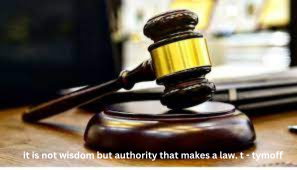Introduction to the quote
Have you ever stopped to ponder the intricate relationship between authority and wisdom when it comes to making laws? The famous saying, “It is not wisdom but authority that makes a law,” sparks a thought-provoking discussion on the dynamics at play in the realm of legislation. Join us as we delve into this intriguing concept and explore its implications throughout history.
Explanation of the meaning behind the quote
Have you ever pondered the significance of the quote, “It is not wisdom but authority that makes a law”? This thought-provoking statement delves into the dynamics between power and knowledge in shaping legislative frameworks. It suggests that laws are often established based on authority rather than rationality or insight.
In essence, this quote implies that those in positions of power have the ability to dictate laws irrespective of their wisdom or lack thereof. It raises questions about whether laws should be formulated by those with expertise and understanding or simply by individuals who wield authority.
By exploring this concept, we can gain a deeper understanding of how governance operates and how decisions are made within societal structures. It challenges us to reflect on the balance between authoritative control and intellectual acumen when enacting regulations for a community’s well-being.
The role of authority in creating laws
Authority plays a pivotal role in the creation of laws within a society. It is not merely about wisdom but also about having the power to enforce these laws effectively. Those in positions of authority have the ability to establish and implement rules that govern how individuals behave and interact with one another.
The influence of authority on lawmaking can be seen throughout history, where rulers and governments have shaped legal systems according to their own agendas. Whether through monarchies, dictatorships, or democracies, those in power have been able to exert their authority in defining what is considered lawful and unlawful.
While some argue that this concept may lead to oppressive or unjust laws being imposed on society, others believe that authority is necessary for maintaining order and stability. Finding a balance between the need for authoritative enforcement and the application of wisdom in creating fair and just laws remains essential for a functioning legal system within any community or nation.
Examples of how authority has influenced laws throughout history
Throughout history, authority figures have played a significant role in shaping laws and regulations. From ancient rulers like Hammurabi, who created one of the earliest recorded legal codes, to modern governments enacting statutes and policies, authority has been a driving force behind legislative decisions.
In medieval Europe, monarchs held absolute power to decree laws that governed their realms. The Magna Carta in 1215 was a pivotal moment when English barons challenged King John’s authority, leading to the establishment of limitations on royal power.
During the Civil Rights Movement in the United States, leaders like Martin Luther King Jr. called for changes to discriminatory laws through nonviolent resistance against governmental authorities enforcing segregation.
Even today, lawmakers around the world continue to rely on their positions of authority to introduce new legislation or amend existing laws based on societal needs and values.
Criticisms of this concept and arguments against it
While the concept of authority dictating laws has its merits, it is not without critics. Some argue that blindly following authority can lead to oppressive and unjust laws that do not serve the best interests of society. This viewpoint emphasizes the importance of questioning authority and advocating for transparency in lawmaking processes.
Furthermore, critics point out that relying solely on authority may stifle innovation and progress. Laws shaped purely by authority might lack flexibility and fail to adapt to changing societal needs or advancements in knowledge and technology.
Another criticism is that placing too much emphasis on authority could undermine individual rights and freedoms. Without considering the principles of justice, fairness, and equality, laws derived solely from authoritative figures may infringe upon basic human rights.
In essence, while acknowledging the role of authority in lawmaking, it is essential to also value critical thinking, ethical considerations, and public participation to ensure that laws are just, equitable, and beneficial for all members of society.
The counterargument: the importance of wisdom in lawmaking
When it comes to lawmaking, wisdom plays a crucial role in crafting effective and just laws. While authority may have the power to enact laws, it is wisdom that guides the decision-making process behind them. Wisdom entails understanding the complexities of society, foreseeing potential consequences, and ensuring fairness for all individuals.
Wisdom allows lawmakers to consider various perspectives, weigh conflicting interests, and strive for solutions that benefit the greater good. It involves drawing upon knowledge, experience, and ethical principles to create laws that stand the test of time and uphold fundamental values.
Incorporating wisdom into lawmaking can lead to more thoughtful policies that address societal needs while promoting justice and equality. By valuing wisdom alongside authority in the legislative process, we can work towards a legal system that truly serves its citizens’ best interests.
Conclusion: finding a balance between authority and wisdom in creating effective laws for society
In crafting laws that govern society, it is not solely authority or wisdom that should prevail, but a delicate balance of both. While authority plays a crucial role in enforcing laws and maintaining order, wisdom is essential in ensuring fairness, justice, and the well-being of all members of society.
By acknowledging the importance of both authority and wisdom in lawmaking, we can strive to create a legal system that upholds the principles of justice while also respecting the rule of law. Finding this equilibrium between authority and wisdom will ultimately lead to the creation of effective laws that serve the greater good and promote a harmonious coexistence within our communities.



